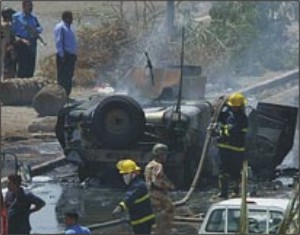Rights Investigation
Iraq
More troops and more violence
U.S. troops presence has averaged 142,000 soldiers a month since the occupation began nearly four years ago. Through this period, violence has increased against both them and the Iraqi civilian population. Despite promises of freedom, democracy and liberation, Iraqis have suffered severe deterioration in security, services, infrastructure and social unity since the U.S.-led occupation began.
 Many Iraqis believe that an increased number of troops will actually make the situation worse. "To increase the number of troops will definitely improve the situation for the troops already on the ground, but a lot more than 20,000 soldiers will be needed to change the situation from defeat to victory," retired Iraqi general Ahmed al-Issa told IPS. "There is no argument that U.S. troops have lost the Iraqi war all over the country, and the only two solutions left are either an increase of 200,000 soldiers or a scheduled withdrawal after certain arrangements with local fighters in order to avoid casualties and tremendous chaos in the country."
Many Iraqis believe that an increased number of troops will actually make the situation worse. "To increase the number of troops will definitely improve the situation for the troops already on the ground, but a lot more than 20,000 soldiers will be needed to change the situation from defeat to victory," retired Iraqi general Ahmed al-Issa told IPS. "There is no argument that U.S. troops have lost the Iraqi war all over the country, and the only two solutions left are either an increase of 200,000 soldiers or a scheduled withdrawal after certain arrangements with local fighters in order to avoid casualties and tremendous chaos in the country."
According to the Washington-based Brookings Institution's Feb. 5 report 'Tracking Variables of Reconstruction and Security in Post-Saddam Iraq', as of January 2007 there were 132,000 U.S. troops in Iraq. Adding 21,500 still does not bring the total to a previous high of 160,000 during December 2005. The same report records 14,650 troops from other countries in Iraq, the lowest number ever.
Some Iraqi military strategists believe that the recent troop increase will be of no value if the goal is security and prosperity for all Iraqis. "Their goal is to crush as many oppositionists as possible," Duraid Aziz, a 46-year-old lawyer and military analyst from Mosul in the north who was visiting Baghdad told IPS. "The first step of their security plan was to raid the Adhamiya Sunni area (of Baghdad) while Mehdi (Shia militia of cleric Muqtada al-Sadr) death squads continue to kill Iraqis under the eyes of the U.S. army." Aziz believes that the U.S. military plans to hand the country over to militias such as the Badr organisation which is the armed wing of the Supreme Council for Islamic Revolution in Iraq a leading Shia party in government that is supportive of Iran. "This increase in American troops is only meant to kill anyone who resists the occupiers," added Aziz.
Over recent days U.S. troops raided several Sunni areas of Baghdad, including the Adhamiya district. On Feb. 7 the chief spokesman for the U.S. military in Iraq told reporters that the plan to secure Baghdad using U.S. and Iraqi forces had begun. "The plan is being fully implemented as we speak," Major General William B. Caldwell told reporters.
The Brookings Institution report listed 185 attacks a day against U.S. and Iraqi security forces during the month of December 2006. That is the highest ever, according to the institution. More U.S. troops have been killed in the last four months in Iraq than in any comparable period since the occupation began in April 2003. Iraqi authorities announced Feb. 5 that at least 1,000 Iraqis had been killed in the previous week in political violence.
"The increase in U.S. troops only means an increase in the agonies of the Iraqi people," Dr. Salam al-Dulaimy, an academic who studied at Baghdad University told IPS. "President Bush is just running forward while waiting for a miracle to take place regardless of the great number of war victims. I see this increase to be another factor of disturbance in Iraq and another way of buying time with Iraqi people's blood."
Sunni areas are facing hard times with the launch of the new Iraqi and U.S. security plans. But Iraqis are paying a heavy price for the unrest. One in seven has left home, according to UN officials. This is the largest movement of people in the Middle East since the war that followed the creation of the state of Israel in 1948. Violence displaces an estimated 1,300 Iraqis every day. More than 1.7 million have been displaced so far.
Source: Global Policy Forum.